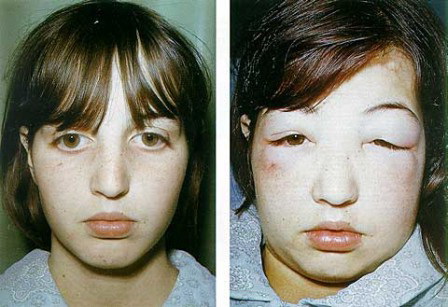Nephrotic syndrome occurs when protein leaks from the kidneys into the urine, thus causing fluids to be drawn out of the blood and into the tissues. This leads to edema or fluid retention in the tissues, which may sometimes be seen as fluid leaking from lower legs. Since protein molecules seep out from the kidneys, blood tests will show low protein in blood. Nephrotic syndrome is associated with various chronic diseases that affect the kidneys, and treatment varies according to the cause.
What Is Nephrotic Syndrome?
Nephrotic syndrome consists of a set of signs and symptoms resulting from kidney damage. The syndrome has four typical hallmarks – proteinuria, hypoalbuminemia, edema, and hyperlipidemia.
The kidneys are the organs which help filter and eliminate the excessive fluids and wastes in the blood. Unlike wastes and excess fluids, albumin (a protein found in blood) normally does not pass out of the kidneys into your urine. However, in people with chronic kidney disease, damage to the filtering system causes albumin to leak into the urine (proteinuria), causing a reduction of albumin levels in the blood (hypoalbuminemia). Since albumin attracts fluids, the blood ceases to hold on to the fluids as it loses these proteins. Excess body fluids therefore leak into the tissues, causing fluid retention or edema.
Another sign of nephrotic syndrome is hyperlipidemia, where you have greater than normal levels of cholesterol in the blood.
What Are the Symptoms of Nephrotic Syndrome?
 The symptoms of people with nephrotic syndrome reflect the different stages of progressive kidney damage. In the early stages of kidney disease, one may not experience any symptoms. However, symptoms become more severe as kidney failure sets in.
The symptoms of people with nephrotic syndrome reflect the different stages of progressive kidney damage. In the early stages of kidney disease, one may not experience any symptoms. However, symptoms become more severe as kidney failure sets in.
Common symptoms include:
- Foamy urine
- Decreased appetite
- Swelling (edema) of the face, abdomen, and limbs
- Weight gain that is not related to diet
Symptoms of advanced kidney disease and nephrotic syndrome:
- Difficult urination
- Cough
- Fever
- Headaches
Serious symptoms that need immediate medical attention:
- Bloody urine
- Convulsions
- Flank pain
- Difficulty in breathing
- High fever
- Scant or absent urine
What Are the Causes & Risk Factors of Nephrotic Syndrome?
Nephrotic syndrome results from damage to the glomeruli, the tiny blood vessels that filter blood in your kidneys. These blood vessels allow wastes and excess fluids to pass out of the body as urine and normally conserve proteins (albumin), sugar, and other important substances in the body. When damaged, proteins and other substances leak from the glomeruli, causing many changes that constitute the nephrotic syndrome.
Damage to the kidneys that results in nephrotic syndrome may be caused by certain conditions and diseases such as:
- Minimal change disease. This kidney disorder, which causes minimal changes in the kidneys when examined under the microscope, is common in children, but the cause of abnormal kidney function is not known.
- Focal segmental glomerulosclerosis. This kidney disorder is characterized by scarring of some glomeruli, which may be related to another condition or genetic defect, but it may also occur for unknown reasons.
- Membranous nephropathy. In this condition, the glomeruli develop thickened membranes, which may be associated with some medical condition, such as malaria, lupus, hepatitis B, or cancer.
- Diabetes. Kidney damage due to diabetes (diabetic nephropathy) can result in nephrotic syndrome.
- Systemic lupus erythematosus (SLE). This is a chronic inflammatory disease that can result in complications such as serious kidney disorder.
- Amyloidosis. This occurs when amyloid (a protein) accumulates in your organs, including the kidneys, thus damaging the filtering system.
- Blood clotting in the kidney vein. Also called renal vein thrombosis, this occurs when blood clots form and block a kidney vein, causing accumulation of fluids in the tissues.
- Heart failure. Certain heart conditions such as constrictive pericarditis or chronic right heart disease can cause kidney damage and nephrotic syndrome.
Risk Factors
Certain risk factors are associated with nephrotic syndrome, but not everyone will develop this condition. These include:
- Chronic abuse of painkillers
- Cancer medications
- Recent infection
- Autoimmune disorders
- Substance abuse
What Are the Treatments for Nephrotic Syndrome?
The treatment for people with nephrotic syndrome involves correcting an underlying medical disorder that is causing kidney damage. In addition, your doctor may recommend medications to control symptoms and treat the complications of the nephrotic syndrome. These include:
- Water pills. These are diuretics, which help control edema by increasing your fluid output, include furosemide (Lasix) and spironolactone (Aldactone).
- Blood pressure medicines. These consist of drugs like angiotensin-converting enzyme inhibitors, which include benazepril (Lotensin), enalapril (Vasotec), and captopril (Capoten), and angiotensin II receptor blockers, which include valsartan (Diovan) and losartan (Cozaar).
- Cholesterol-reducing drugs. These medications are called statins and they help lower your blood cholesterol levels. These include fluvastatin (Lescol), atorvastatin (Lipitor), lovastatin (Mevacor), rosuvastatin (Crestor), simvastatin (Zocor), and pravastatin (Pravachol).
- Immune-system-suppressants. Medications such as corticosteroids, which help control your immune system, may reduce inflammation associated with certain kidney disorders, like membranous nephropathy.
- Blood thinners. Anticoagulants are drugs that help prevent your blood from clotting and these include heparin and warfarin (Coumadin).
Diet Changes
Diet changes may help improve symptoms of nephrotic syndrome. You may be referred to a dietitian who will discuss how and what you can eat to help you cope with nephrotic syndrome. These diet changes may include:
- Eating protein sources from lean
- Reducing fat and cholesterol intake to control cholesterol levels
- Eating a low-salt diet to control swelling (edema)
